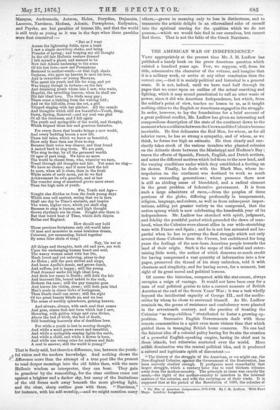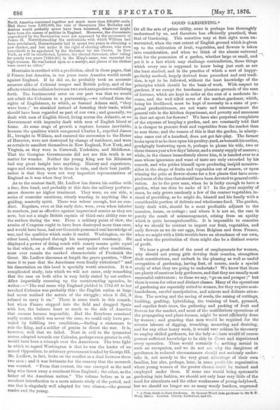THE AMERICAN WAR OF INDEPENDENCE,* VERY appropriately at the present
time Mr. J. M. Ludlow has published a handy book on the grave American question which existed a hundred years ago. Few, we suppose, will, from its title, misconceive the character of the volume, and imagine that it is a military work, or arrive at any other conclusion than the correct one,—that it is mainly political and historical in a general sense. It is not, indeed, until we have read half through its pages that we come upon an outline of the actual marching and fighting, which it may sound paradoxical to call an utter waste of power, since it did win American Independence, but which, from the soldier's point of view, teaches no lesson to us, as it taught nothing either to the English or Americans engaged in the struggle. In order, however, to lay the foundations for a brief account of a great political conflict, Mr. Ludlow has given an interesting and compendious description of the state of the continent down to the moment when a collision between the Crown and the Colonies became inevitable. He first delineates the Red Man, for whom, as for all inferior races, he has so strong a sympathy, and of whom, as we think, he forms too high an estimate. He then clearly and suc- cinctly takes stock of the various invaders who planted colonies on the Atlantic shore between the Mississippi and Hudson's Bay ; traces the efforts of Spanish, French, English, and Dutch settlers, and notes the different motives which led them to the new land, and the varying conditions under which they established a footing on its shores. Finally, he deals with the Black Man, whose in- terpolation on the continent was destined to work so much woe to succeeding generations ; whose presence there now is still an abiding cause of bloodshed, and a radical element in the great problem of federative government. It is from such a large admixture of races,—from the peoples of three portions of the globe, differing profoundly in temperament,
religion, language, and colour, as well as from subsequent impor-
tations, adding yet greater variety to the compound, that the nation sprang which is now celebrating the hundredth year of its independence. Mr. Ludlow has sketched with spirit, judgment, and fidelity the youthful period which preceded the dawn of man- hood, when the Colonies were almost allies in our wide-stretching wars with France and Spain ; and he is not less animated and im- partial when he has to portray the final struggle which not only severed these Colonies from the Crown, but embittered for long years the feelings of the new-born American people towards the land of their origin. Such is the scope of this useful and enter- taining little work, the author of which deserves so much credit for having compressed a vast quantity of information into a few pages, preserved the thread of his story unbroken, told it with clearness and simplicity, and for having never, for a moment, lost sight of its great moral and political lessons.
Of course the historian, compared with the statesman, always
occupies a coign of vantage. It would not have been easy for a man of real political genius to take a correct measure of British America at the end of the Seven Years' War; it was a task wholly beyond the intellectual capacity of George III., and the medio-
crities by whom he chose to surround himself. As Mr. Ludlow reminds us, the germs of resistance and confederacy were planted in the seventeenth century, and the practice of treating the Colonies "as step-children" contributed to foster a growing op- position. Successive English Governments dealt with these remote communities in a spirit even more vicious than that which guided them in managing British home concerns. No one had the faintest idea of a colonial policy having for its aim the creation of a powerful English-speaking empire, having its chief seat in these islands, but otherwise scattered over the world. Mere selfish domination was the central political idea, and it produced a natural and legitimate spirit of discontent :—
" The history of the struggle of the American, or we might say, the New-England Colonies, against the Government of the Restoration, has been scarcely studied enough. It prefigures most remarkably that larger struggle, which a century later was to rend thirteen colonies away from the mother-country. The principle at issue was exactly the same,—the right of the mother-country to interfere in the internal matters of the colonies, and with the carrying-on of their trade. It is supposed that at the period of the Revolution of 1688, the colonies of * The TVar at American Independence, 1775-1783. By J.11. Ludlow. With Four North America contained together not much more than 200,000 souls. Had there been 2,000,000, the rule of Governors like Berkeley and Andros would probably never have been tolerated, whatever might have been the course of politics in England. Moreover, the discontents engendered by the Restoration were not appeased by the successors of James IL Notwithstanding the enthusiasm with which William had been proclaimed, Massachusetts had to spend two years in obtaining a new charter, and lost under it the right of electing officers, who were henceforth to be appointed by the Governor for the Crown. In New York, as will be recollected, Leister, the elected Governor, after riding for nearly two years [1688-90] in the King's name, was executed for high-treason. He was looked upon as a martyr, and pieces of his clothes were saved as relics."
Montcalm is credited with a prediction, cited in these pages, that if France lost America, in ten years more America would revolt against England. If he did so, he probably took an accurate measure alike of Colonial temper and British policy, and of the effects which the collision between two such antagonists would bring forth. The fundamental error on our part was that we would not admit the Colonists to a partnership,—we refused them the rights of Englishmen, to which, as Samuel Adams said, "they were born ;" we shackled instead of fostering their trade, which should have been regarded as part of our own ; and generally, we dealt with men of English blood, living across the Atlantic, as no Government with impunity dealt with men of English blood at home. At some stage of growth a rupture became inevitable, because the qualities which conquered Charles L, expelled James H., brought in William, and ensured the succession to the House of Hanover, were not destroyed by change of residence, and were as certain to manifest themselves in New England, New York, and Virginia, as they were in Cornwall, Yorkshire, and Middlesex. That the Georgian Governments did not see this truth is no matter for wonder. Neither the young King nor his Ministers had any great insight into anything. History and experience, sages and statesmen, spoke to them in vain, and their best justifi- cation is that they were not very imperfect representatives of England as it was when they lived.
As to the contest itself, Mr. Ludlow has drawn his outline with a free, firm hand, and probably at this date the military perform- ances deserve no higher treatment. They were, on our side, a series of muscular exertions, utterly wanting in anything like a guiding, masterly spirit. There was valour enough, but no con- duct. Regulars, even at this early date, were, even when inferior in numbers, just as effective against improvised armies as they are now, but not a single British captain of third-rate ability rose to the surface during the war. From a military point of view, the armies of Congress ought to have been destroyed more than once, and would have been, had our Generals possessed real knowledge of war, and the qualities which make it useful. Washington, on the other hand, triumphed through his unsurpassed constancy. He displayed a power of doing much with scanty means quite equal to that which, on a different scale and under other conditions, must ever remain the marked characteristic of Frederick the Great. Mr. Ludlow discusses at length the grave question, "How came it to pass that the Americans were finally victorious?" and his dissertation on this head is specially worth attention. It is a complicated study, into which we will not enter, only remarking that the case on both sides is very fairly stated by our author. After impartially summing up the counteracting agencies, he writes :—" The real cause why England yielded in 1782-83 to her revolted Colonies was probably this : the English nation at large had never realised the nature of the struggle ; when it did, it refused to carry it on." There is some truth in this remark, but when France stepped into the field and dragged Spain with her, the balance leant so much to the aide of America that success became impossible. Had the Bourbons remained really neuter, which was never the case, we could only have pre- vailed by fulfilling two conditions,—finding a statesman to rule the King, and a soldier of genius to direct the war. It is, however, well that we failed. Next in evil to the tyrannical course adopted towards our Colonies, perhaps even greater in evil, would have been a triumph over the Americans. The true light in which to regard Washington is that he was the leader of an armed Opposition, to arbitrary government headed by George III. Mr. Ludlow, in fact, looks on the conflict as a duel between these two men ; and it was fortunate for the country that the monarch was worsted. "From that contest, the one emerged as the mad king who threw away a continent from England ; the other, as the father of the American nation." The volume before us is an excellent introduction to a more minute study of the period, and one that is singularly well adapted for two classes,—the general reader and the young.































 Previous page
Previous page